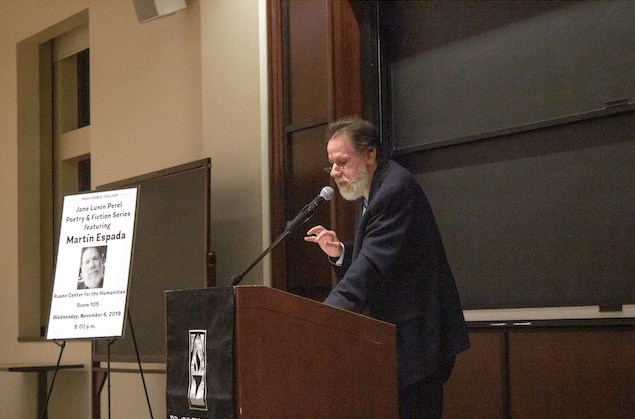by The Cowl Editor on November 14, 2019
On-Campus
by Jennifer Villeda ’20 A&E Staff
A tall man wearing a loose, casual suit walked in front of the audience. His gentle face looked over the crowd, anxiously waiting for him to speak. He began to let the words flow. The poems he recited began to take a life of their own, captivating everyone’s attention.
Martín Espada was the featured speaker at the fourth annual Jane Lunin Perel Poetry and Fiction Series. He spoke in one of the lecture rooms of the Ruane Center for Humanities, which was overflowed with Providence College students, professors, and alumni who sought to see and listen to him.
The poet, essayist, translator, attorney, and professor at the University of Massachusetts-Amherst uses his experiences to enrich his writing. Jane Lunin, professor emeritus who created this series, spoke highly of Espada and how he inspired her in her work at Providence College. Meanwhile, Espada swayed slightly, appearing rather sheepish to accept her praise.
It is inspiring to read and hear his poetry out loud, as Espada gives a voice to all those who are often shunned by society, like immigrants, the poor, and many more. Before each reading, he gave a small introduction about what inspired his pieces, which allowed the audience to gain context and a closer look into Espada’s character.
The Latinx experience and immigration are common topics he emphasizes in his writing. He wrote a poem titled “Floaters,” which focuses on the drowning of a father and 23-month old daughter in late June near the border in Rio Grande.
This poem was based on a Facebook group chat between a few members of Border Patrol who believed the photos were fake. A few lines that leave a mark are; “And the dead have names, a feast day parade of names” and “Say Óscar Alberto Martínez Ramíerez. Say Angie Valeria Martínez Ávalos. See how they rise off the tongue, the calling of bird to bird somewhere.”

Espada explores the lives of the father and daughter to illustrate the ignorance of the members of the chat in choosing to call them “floaters,” a term used for people who attempt to cross but drown in the Rio Grande. The poem captures a powerful variety of emotions through beautiful language, as Espada highlights how these members avoid giving the migrants identities. These members choose to reduce the migrants to only be “floaters” when they are people who had families and jobs before deciding to risk coming to the U.S.
He closed the evening with a reading that many related to titled “Letter to My Father.” Espada’s dad has been particularly influential in his life and has been the subject of a number of his poems.
After reading “Letter to My Father,” a student in the audience asked how one tackles such tough subjects in regards to losing a love one. Espada told her, “Don’t write, type. Trust those instincts. Trust those hands.” He continued, “Your writing will console others. It may not console you but others and that’s extraordinary.” There is a beauty in helping others when you yourself are still struggling, something to be said of extending a branch of empathy and recognizing that we all go through similar experiences.
Espada brought a humble but powerful presence to the Ruane Center for the Humanities and connected everyone to the worlds of the people he writes about. He made people listen and open their worlds to other experiences.